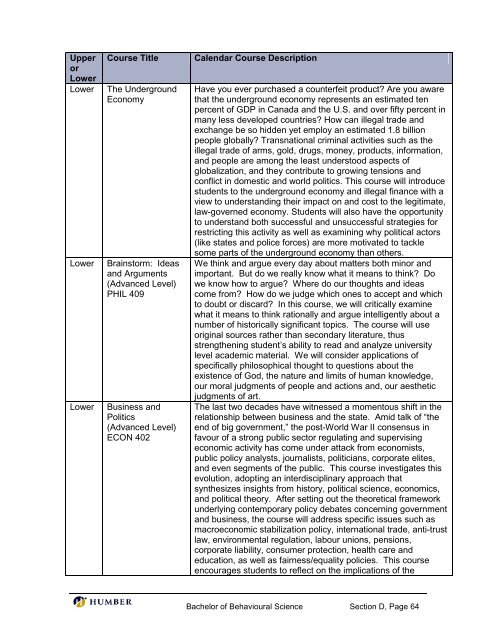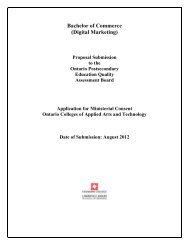Bachelor of Behavioural Science - Postsecondary Education Quality ...
Bachelor of Behavioural Science - Postsecondary Education Quality ...
Bachelor of Behavioural Science - Postsecondary Education Quality ...
You also want an ePaper? Increase the reach of your titles
YUMPU automatically turns print PDFs into web optimized ePapers that Google loves.
Upper<br />
or<br />
Lower<br />
Lower<br />
Lower<br />
Lower<br />
Course Title<br />
The Underground<br />
Economy<br />
Brainstorm: Ideas<br />
and Arguments<br />
(Advanced Level)<br />
PHIL 409<br />
Business and<br />
Politics<br />
(Advanced Level)<br />
ECON 402<br />
Calendar Course Description<br />
Have you ever purchased a counterfeit product Are you aware<br />
that the underground economy represents an estimated ten<br />
percent <strong>of</strong> GDP in Canada and the U.S. and over fifty percent in<br />
many less developed countries How can illegal trade and<br />
exchange be so hidden yet employ an estimated 1.8 billion<br />
people globally Transnational criminal activities such as the<br />
illegal trade <strong>of</strong> arms, gold, drugs, money, products, information,<br />
and people are among the least understood aspects <strong>of</strong><br />
globalization, and they contribute to growing tensions and<br />
conflict in domestic and world politics. This course will introduce<br />
students to the underground economy and illegal finance with a<br />
view to understanding their impact on and cost to the legitimate,<br />
law-governed economy. Students will also have the opportunity<br />
to understand both successful and unsuccessful strategies for<br />
restricting this activity as well as examining why political actors<br />
(like states and police forces) are more motivated to tackle<br />
some parts <strong>of</strong> the underground economy than others.<br />
We think and argue every day about matters both minor and<br />
important. But do we really know what it means to think Do<br />
we know how to argue Where do our thoughts and ideas<br />
come from How do we judge which ones to accept and which<br />
to doubt or discard In this course, we will critically examine<br />
what it means to think rationally and argue intelligently about a<br />
number <strong>of</strong> historically significant topics. The course will use<br />
original sources rather than secondary literature, thus<br />
strengthening student‘s ability to read and analyze university<br />
level academic material. We will consider applications <strong>of</strong><br />
specifically philosophical thought to questions about the<br />
existence <strong>of</strong> God, the nature and limits <strong>of</strong> human knowledge,<br />
our moral judgments <strong>of</strong> people and actions and, our aesthetic<br />
judgments <strong>of</strong> art.<br />
The last two decades have witnessed a momentous shift in the<br />
relationship between business and the state. Amid talk <strong>of</strong> ―the<br />
end <strong>of</strong> big government,‖ the post-World War II consensus in<br />
favour <strong>of</strong> a strong public sector regulating and supervising<br />
economic activity has come under attack from economists,<br />
public policy analysts, journalists, politicians, corporate elites,<br />
and even segments <strong>of</strong> the public. This course investigates this<br />
evolution, adopting an interdisciplinary approach that<br />
synthesizes insights from history, political science, economics,<br />
and political theory. After setting out the theoretical framework<br />
underlying contemporary policy debates concerning government<br />
and business, the course will address specific issues such as<br />
macroeconomic stabilization policy, international trade, anti-trust<br />
law, environmental regulation, labour unions, pensions,<br />
corporate liability, consumer protection, health care and<br />
education, as well as fairness/equality policies. This course<br />
encourages students to reflect on the implications <strong>of</strong> the<br />
<strong>Bachelor</strong> <strong>of</strong> <strong>Behavioural</strong> <strong>Science</strong> Section D, Page 64
















